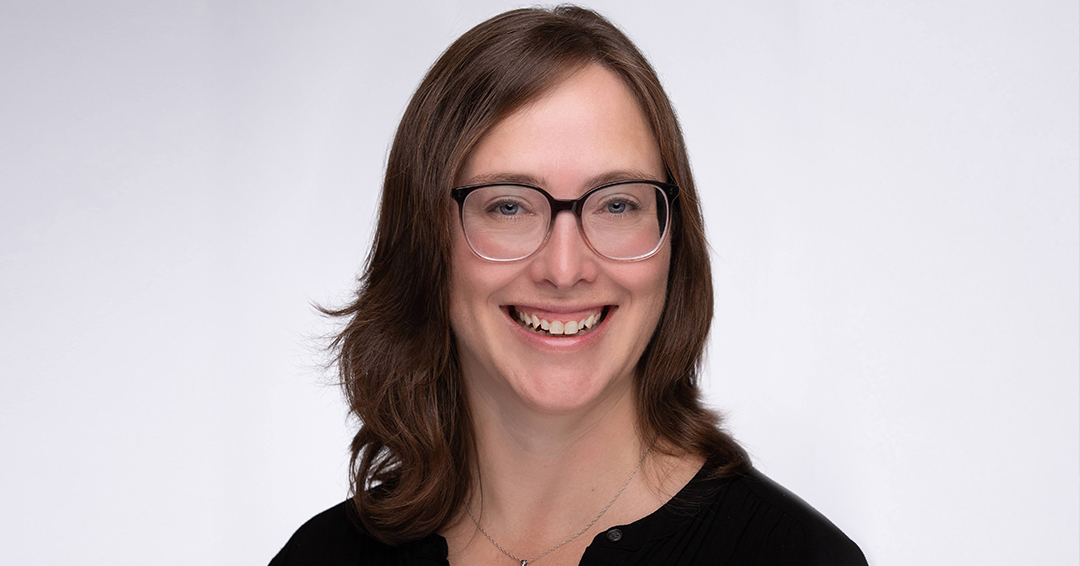
Part of our series: FMHS community members from away – The Faculty of Medicine and Health Sciences (FMHS) is made up of diverse communities, including people from across Canada and around the world. This series recognizes those from outside the province who have chosen to bring their talents and expertise to McGill University. Thank you for all that you contribute!
A bilingual New Brunswicker, Sara Saunders, PhD, OT, Director of the Occupational Therapy Program in the School of Physical and Occupational Therapy (SPOT), has been in Montreal for 17 years. We caught up with her to hear about what she loves about living here, the new profile of OT student at McGill and her advice for those coming to work and study from out of province.
Can you tell us how long you’ve been in Montreal and how you ended up moving here?
I’m from Moncton and I was a clinician — part of the old guard with a bachelor’s degree in OT – and in 2006 I decided I wanted to do a master’s degree, which quickly turned into a PhD. I became very involved at SPOT and started TA-ing and then teaching courses. After becoming a faculty lecturer, I then became the associate director of the program and now the director. It was an unexpected career change.
How did you end up choosing to come to Montreal and to McGill?
Being from New Brunswick, my partner – who is Acadian – and I would come to Montreal all the time when we were young. We’d come for a weekend and go see a show. We always loved spending time here. I think my choice to go back to school was 50/50 wanting to do a master’s but also a reason to live in Montreal. I didn’t apply anywhere else, just McGill.
How was your French before you arrived?
It was good. I did French immersion, which is especially good in Moncton because you’re taught by Acadians. So I felt very confident in my French and I considered myself completely bilingual.
We go back to New Brunswick all the time and my whole family on my partner’s side is francophone, so I’ve always spoken a lot of French in my personal life and I use it most days in my daily life in Montreal. Many of my leisure activities involve French. And then, of course, my job in the broader Quebec environment involves speaking with leaders of other programs and government officials, and our Quebec Order of Occupational Therapists. I’m very thankful that I’m able to function and communicate.
What do you love about living here?
Montreal is just such a fabulous place, I just love everything about it. When I was younger, I loved the festivals, the music scene, the arts scene, the Nuit Blanche. The culture here is so vibrant. It’s a tight, supportive environment. This city invests in its neighbourhoods, in people going out and spending time together. I live in the Mile End which is so densely packed that I can walk within a kilometere radius and have everything that I need. The quality of life here is very, very high.
Have there been any challenges?
As I said, in New Brunswick, I would confidently say I’m bilingual. And then I came here, and felt immediately labelled as an anglophone. I feel like my confidence in my French was affected. I had to start taking French classes here because of that, even though I was working as a clinician, in French, when I first moved here. It’s even more frustrating for my partner because people tend to find his Acadian accent cute, but also very confusing. They’ll say to him, ‘Wow, your French is so good.’ ‘Yeah, I’m a francophone!’
Can you share a little bit about how you contribute to Quebec society through your work at McGill, and if that has evolved over the years.
My contribution is that I run a program that trains occupational therapists in Quebec. What’s interesting is that when I first started in this role, historically we invited people from everywhere to come to Quebec to train to be an occupational therapist. In the last four years or so we have had to shift our admissions and we put into place – along with a lot of the other health professions programs within our Faculty – a French language requirement. Because, though we do want to invite everyone to come, the reality of living and studying in Quebec is that you do need to be able to function in French when you’re out in the healthcare system. This has changed the type of person applying to the program. We’re attracting more Quebec applicants along with a smaller number of bilingual people from out of province.
Do you have any advice for people who decide to come to McGill to work or study from other provinces?
I would encourage them to take full advantage of living here and to invest in learning French. So if you’re ready to come and embrace the fact that this is a bilingual city in a French-speaking province, come and do it. It’s a great opportunity. And we do have lots of supports already within McGill, such as the Dialogue McGill project that offers courses and training to support people to learn French.
Anything you’d like to add?
My experience here in Montreal has been very, very positive. I’ve been here for 17 years and I don’t have any plans for leaving anytime soon. I’m happy to have my career here and I love being here. I just wish the government wouldn’t make it so hard for me to be here.
People from other provinces could come and fall in love with Quebec and stay and contribute to society. There’s place for everybody here. From my perspective, we’re already doing what Quebec would like for us to be doing: we’re training bilingual therapists.

